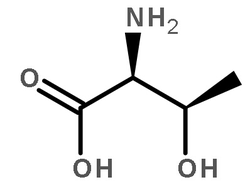Protein serine/threonine kinase

Protein serine/threonine kinase structure
|
Common Name | Protein serine/threonine kinase | ||
|---|---|---|---|---|
| CAS Number | 9026-43-1 | Molecular Weight | 119.11916 | |
| Density | N/A | Boiling Point | N/A | |
| Molecular Formula | C4H9NO3 | Melting Point | N/A | |
| MSDS | USA | Flash Point | N/A | |
Use of Protein serine/threonine kinaseProtein serine/threonine kinase (Ser/Thr protein kinase) is a biochemical reagent that can be used as a biological material or organic compound for life science related research. |
| Name | Kinase(Phosphorylating), Protein Serine or Threonine |
|---|---|
| Synonym | More Synonyms |
| Description | Protein serine/threonine kinase (Ser/Thr protein kinase) is a biochemical reagent that can be used as a biological material or organic compound for life science related research. |
|---|---|
| Related Catalog |
| Molecular Formula | C4H9NO3 |
|---|---|
| Molecular Weight | 119.11916 |
| Storage condition | 20°C |
| Personal Protective Equipment | Eyeshields;Gloves;type N95 (US);type P1 (EN143) respirator filter |
|---|---|
| RIDADR | NONH for all modes of transport |
|
Expression and localization of five members of the testis-specific serine kinase (Tssk) family in mouse and human sperm and testis.
Mol. Hum. Reprod. 17(1) , 42-56, (2011) Members of the testis-specific serine/threonine kinases (Tssk) family may have a role in sperm differentiation in the testis and/or fertilization. To gain insight into the functional relevance of thes... |
|
|
Hipk is an essential protein that promotes Notch signal transduction in theDrosophilaeye by inhibition of the global co-repressor Groucho
Dev. Biol. 325(1) , 263-72, (2009) Homeodomain interacting protein kinase (Hipk) is a member of a novel family of serine/threonine kinases. Extensive biochemical studies of vertebrate homologs, particularly Hipk2, have identified a gro... |
|
|
Drosophila Smt3 negatively regulates JNK signaling through sequestering Hipk in the nucleus.
Development 138(12) , 2477-85, (2011) Post-translational modification by the small ubiquitin-related modifier (SUMO) is important for a variety of cellular and developmental processes. However, the precise mechanism(s) that connects sumoy... |
| MFCD00132121 |